GALLUP NEWS SERVICE
PRINCETON, NJ -- National security adviser Condoleezza Rice's public testimony before the independent commission investigating the 9/11 terrorist attacks will be one of the major news events of the week. The Bush administration has been under attack from former counterterrorism official Richard Clarke (and others) for the way it handled intelligence before the attacks, and for its focus on Iraq afterward. Rice is expected to answer questions about what the administration did or did not know in the first eight months of its tenure in office, and to give more detailed rationales for the actions taken in the 2 1/2 years since.
Here are key questions and answers relating to the public-opinion context for Rice's appearance.
Rice's testimony comes two weeks after the highly publicized appearance of former counterterrorism official Clarke -- who was critical of Bush, Rice, and other members of the Bush administration. Whom are Americans most likely to believe -- Clarke or Rice -- if their testimony conflicts?
Americans were evenly divided when they were asked in a March 26-28 Gallup Poll if they were more likely to believe Clarke or current members of the Bush administration on issues relating to the intelligence before 9/11.
| Whom Are You Most Likely to Believe About 9/11 Intelligence? |
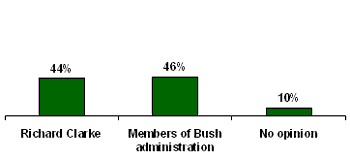 |
| March 26-28, 2004 |
Not surprisingly, Republicans overwhelmingly say they believe the members of the Bush administration, while Democrats overwhelmingly say they believe Clarke.
Who are you more likely to believe in this matter -- [ROTATED: Richard Clarke (or) current members of the Bush administration]?
|
Richard Clarke |
Members of the Bush administration |
Don't know |
|
|
Republicans |
11% |
83 |
6 |
|
Independents |
51% |
36 |
13 |
|
Democrats |
76% |
13 |
11 |
How important will these hearings be as an election issue?
It's hard to tell. The public rates terrorism in general as an important election issue. The latest Gallup polling -- conducted March 26-28, after much of the initial burst of criticism from Clarke and the 9/11 commission hearings -- shows that Bush's overall job approval rating has not fallen (although his approval rating on handling terrorism is lower than it has been previously) and that support for the war in Iraq has remained constant.
Most of the positions Rice is likely to take on Thursday have already been enunciated by Bush administration officials, making it unlikely that Rice will make startling new revelations. Additionally, it is clear that most Republicans, on the one hand, are strongly inclined to be positively predisposed to Rice's testimony, while most Democrats, on the other, are just as strongly inclined to be negatively predisposed. Thus, the probabilities are reasonably high that Rice's testimony will not have a major impact on how the public views the Bush administration or the war in Iraq.
What is Rice's image among the American public as she prepares to testify on Thursday? Do Americans know much about her?
Three-quarters of Americans say they know enough about Rice to have an opinion of her, although it is not clear exactly how deep or detailed the public's knowledge is.
By a 2-to-1 margin, Rice's image is more positive than negative, but slightly more Americans view her unfavorably now than was the case last fall:
| Opinion of National Security Adviser Condoleezza Rice |
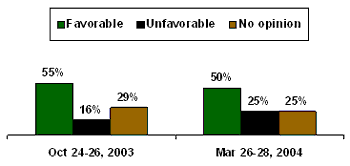 |
Rice's unfavorable rating has risen from 16% to 25% over the last six months, while her favorable rating has dropped by five points. She has become slightly better known; 71% had an opinion of her last fall, compared with 75% today. The March 26-28 poll was conducted during the controversy surrounding the 9/11 commission hearings and Clarke's book, "Against All Enemies"; it may be that Rice's image has been hurt by those events, especially considering her initial refusal to testify under oath.
Do Americans believe that the Bush (or Clinton) administration should have been able to stop the 9/11 attacks?
Not for the most part. The significant majority of Americans apparently agree with Bush when he said: "Had we had the information that was necessary to stop an attack, I'd have stopped the attack. And I'm convinced any other government would have, too." Just 27% of the American public says that the administration should have been able to prevent the attacks, while 67% say the administration did all that it could have been expected to.
| Should Bush Administration Have Been
Able to Prevent 9/11 Attacks? |
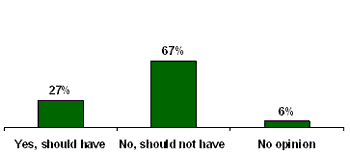 |
| March 26-28, 2004 |
As is true with all questions relating to administration policies, the responses are differentiated by partisanship, but in this instance, not as much as is the case for many other issues:
| Should Bush Administration Have Been
Able to Prevent 9/11 Attacks? |
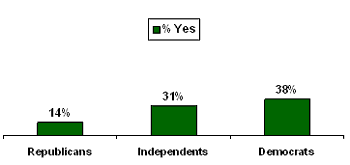 |
| March 26-28, 2004 |
Only 38% of Democrats, who could be expected to be most critical of the Bush administration, believe that Bush and his staff could have prevented the attacks. Few Republicans agree.
At the same time, the public feels that both the Bush and the Clinton administrations could have done more to prevent terrorism before 9/11:
| Did Administration Do All That Could
Be Expected to Prevent Terrorist Attacks? |
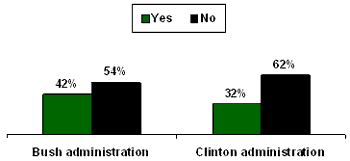 |
| March 26-28, 2004 |
In other words, while the majority of Americans say that both the Bush and the Clinton administrations didn't do all that they could have been expected to, the public apparently is not willing to say that the current administration was negligent enough to be held responsible for the attacks.
Americans are actually a little more likely to believe the Clinton administration should have done more to help prevent terrorism than they are to believe that about the Bush administration. This seems logical. Bush had been in office only about eight months when the attacks took place, and it has become increasingly clear as a result of recent news reports and testimony at the 9/11 commission that Bill Clinton and his administration were well aware of the problems posed by terrorists and Osama bin Laden throughout Clinton's two terms in the 1990s.
Bush and his advisers have been reluctant to testify publicly on 9/11. Do Americans think that the Bush administration has told all it knows?
No. This is a clear perceptual liability for the administration and an issue that Rice will have to face in her testimony on Thursday. The American public has a decided suspicion that there is more to what administration officials knew or did not know prior to the terrorist attacks than has been revealed to date.
Fifty-three percent of Americans say they believe the Bush administration is "covering up something about its handling of intelligence information concerning possible terrorist attacks before Sept. 11," while 41% do not believe this.
| Is Bush Administration Covering Up Information Concerning 9/11 Attacks? |
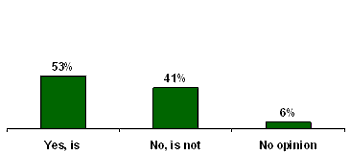 |
| March 26-28, 2004 |
To be sure, these results are predictably partisan in their orientation:
| Is Bush Administration Covering Up Information Concerning 9/11 Attacks? |
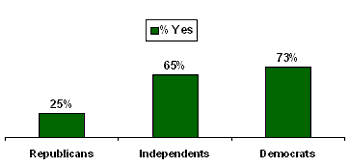 |
| March 26-28, 2004 |
A central focus of the Bush administration's positioning of Iraq is to connect it to the more general war on terrorism. Does the public buy into this rationale for the war in Iraq?
About half of Americans are willing to agree that the war in Iraq is part of the war on terrorism, while the other half say that it is a separate military action. Agreement that Iraq is connected to the war on terrorism has dropped slightly since last August:
Do you consider the war in Iraq to be part of the war on terrorism that began on September 11, 2001, or do you consider it to be an entirely separate military action?
|
Part of war |
Separate |
No |
|
|
2004 Mar 26-28 |
50% |
48 |
2 |
|
2003 Aug 25-26 |
57% |
41 |
2 |
There is a similar pattern of response when Americans are asked to respond to the criticism of Clarke and others that the Bush administration was too fixated on going to war against Iraq after the 9/11 terrorist attacks and did not pay enough attention to al Qaeda. This will almost certainly form a major part of the questioning of Rice on Thursday. About half of the American public agrees with the argument that too much attention was paid to Iraq, while the other half disagree:
Which comes closer to your view of George W. Bush's actions concerning terrorism after the terrorist attacks on September 11th -- [ROTATED: Bush did not pay enough attention to the threat against the United States from al Qaeda because he was too concerned about Saddam Hussein, (or) Bush paid the right amount of attention to the threat against the United States from al Qaeda]?
|
Did not pay |
Paid the right |
No |
|
|
2004 Mar 26-28 |
46% |
49 |
5 |
Survey Methods
These results are based on telephone interviews with a randomly selected national sample of 1,001 adults, aged 18 and older, conducted March 26-28, 2004. For results based on this sample, one can say with 95% confidence that the maximum error attributable to sampling and other random effects is ±3 percentage points. In addition to sampling error, question wording and practical difficulties in conducting surveys can introduce error or bias into the findings of public opinion polls.
